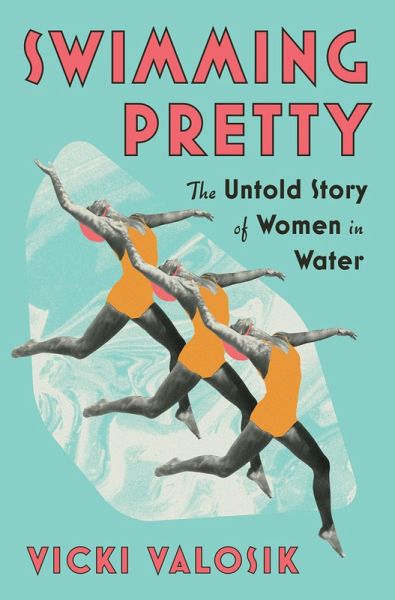
Swimming Pretty (eBook, ePUB)
The Untold Story of Women in Water
Versandkostenfrei!
Sofort per Download lieferbar
15,95 €
inkl. MwSt.
Weitere Ausgaben:

PAYBACK Punkte
8 °P sammeln!
Shortlisted for the Vikki Orvice Award for Women's Sports Writing (Charles Tyrwhitt Sports Book Awards) A groundbreaking history of how women found synchronicityand powerin water.If you're not strong enough to swim fast, you're probably not strong enough to swim 'pretty,' said a young Esther Williams to theater impresario Billy Rose. Since the nineteenth century, tensions between beauty and strength, aesthetics and athleticism have both impeded and propelled the careers of female swimmersnone more so than synchronized swimmers, for whom Williams is often considered godmother.In this revelatory...
Shortlisted for the Vikki Orvice Award for Women's Sports Writing (Charles Tyrwhitt Sports Book Awards)
A groundbreaking history of how women found synchronicityand powerin water.
If you're not strong enough to swim fast, you're probably not strong enough to swim 'pretty,' said a young Esther Williams to theater impresario Billy Rose. Since the nineteenth century, tensions between beauty and strength, aesthetics and athleticism have both impeded and propelled the careers of female swimmersnone more so than synchronized swimmers, for whom Williams is often considered godmother.
In this revelatory history, Vicki Valosik traces a century of aquatic performance, from vaudeville to the Olympic arena, and brings to life the colorful cast of characters whose pretty swimming not only laid the groundwork for an altogether new sport but forever changed women's relationships with water. Williams, who became a Hollywood sensation for her splashy aquamusicals, was just one in a long, bedazzled line of swimmers who began their careers as athletes but found greater opportunity, and often social acceptance, in the world of show business.
Early starlets like Lurline the Water Queen performed scientific swimming, a set of moves previously only practiced by menincluding Benjamin Franklinthat focused on form and exhibited mastery in the water. Demonstrating their fancy feats in aquariums and water tanks rolled onto music hall stages, these women stunned Victorian audiences with their physical dexterity and defied society's rigid expectations of what was proper and possible for their sex.
Far more than bathing beauties, they ushered in sensible swimwear and influenced lifesaving and physical education programs, helping to drop national drowning rates and paving the way for new generations of female athletes. When a Chicago physical educator matched their aquatic movements to music in the 1920s, young girls flocked to take part in synchronized swimming. But despite overwhelming love from audiences and the Olympic ambitions of its practitioners, synchro was long perceived as little more than entertaining pageantry, and its athletes would face a battle against the current to earn a spot at the highest echelons of sport.
Now, on the fortieth anniversary of synchronized swimming's elevation to Olympic status, Swimming Pretty honors its incredible history of grit, glamor, and sheer athleticism.
A groundbreaking history of how women found synchronicityand powerin water.
If you're not strong enough to swim fast, you're probably not strong enough to swim 'pretty,' said a young Esther Williams to theater impresario Billy Rose. Since the nineteenth century, tensions between beauty and strength, aesthetics and athleticism have both impeded and propelled the careers of female swimmersnone more so than synchronized swimmers, for whom Williams is often considered godmother.
In this revelatory history, Vicki Valosik traces a century of aquatic performance, from vaudeville to the Olympic arena, and brings to life the colorful cast of characters whose pretty swimming not only laid the groundwork for an altogether new sport but forever changed women's relationships with water. Williams, who became a Hollywood sensation for her splashy aquamusicals, was just one in a long, bedazzled line of swimmers who began their careers as athletes but found greater opportunity, and often social acceptance, in the world of show business.
Early starlets like Lurline the Water Queen performed scientific swimming, a set of moves previously only practiced by menincluding Benjamin Franklinthat focused on form and exhibited mastery in the water. Demonstrating their fancy feats in aquariums and water tanks rolled onto music hall stages, these women stunned Victorian audiences with their physical dexterity and defied society's rigid expectations of what was proper and possible for their sex.
Far more than bathing beauties, they ushered in sensible swimwear and influenced lifesaving and physical education programs, helping to drop national drowning rates and paving the way for new generations of female athletes. When a Chicago physical educator matched their aquatic movements to music in the 1920s, young girls flocked to take part in synchronized swimming. But despite overwhelming love from audiences and the Olympic ambitions of its practitioners, synchro was long perceived as little more than entertaining pageantry, and its athletes would face a battle against the current to earn a spot at the highest echelons of sport.
Now, on the fortieth anniversary of synchronized swimming's elevation to Olympic status, Swimming Pretty honors its incredible history of grit, glamor, and sheer athleticism.
Dieser Download kann aus rechtlichen Gründen nur mit Rechnungsadresse in A, D ausgeliefert werden.













